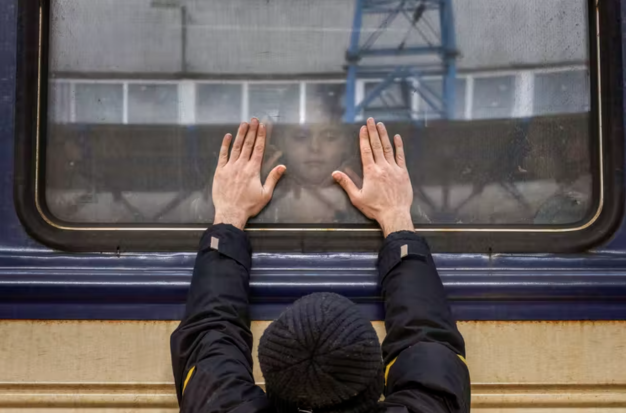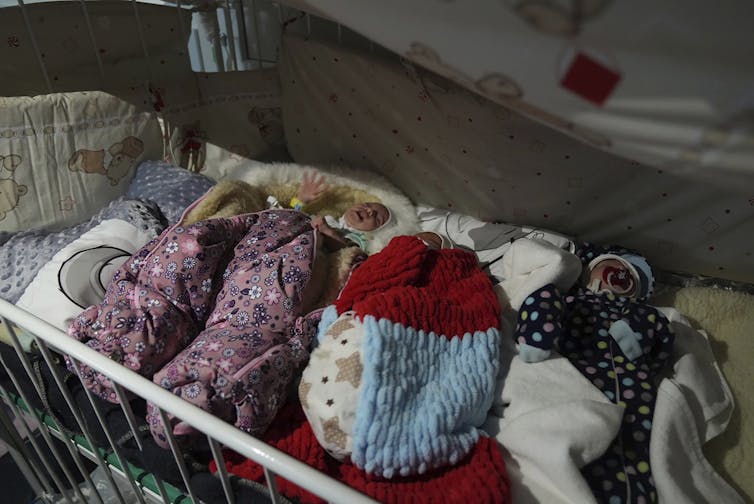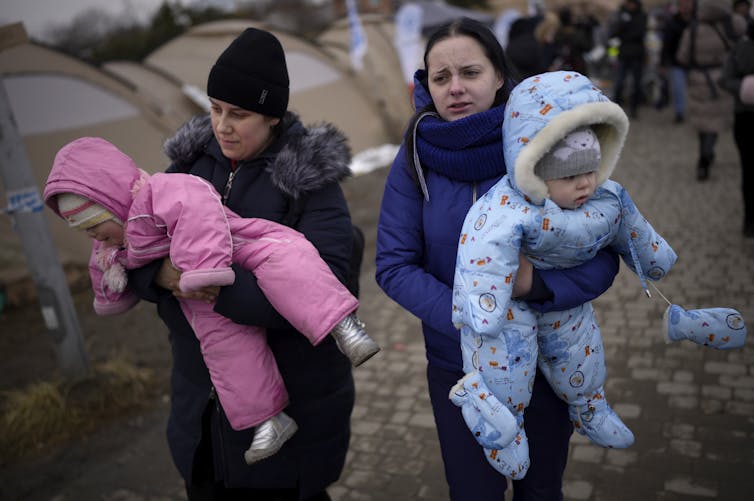
Family separations in Ukraine highlight the importance of children’s rights
Given the conscription of men aged 18 to 60 in Ukraine, the majority of Ukrainians fleeing into neighbouring countries are women and children. Most adult men and many disabled and older people have been left behind. The resulting family separation poses legal and social challenges that need to be addressed in gender- and age-sensitive ways.
Unaccompanied and separated children require specific protection and care because of their developing capacities to care for themselves and intergenerational power hierarchies. That means that most of the time, adults control resources and decision-making, while children have fewer opportunities to advocate for their own choices, well-being and rights.
As the number of children who flee without their families increases, it’s not clear whether there’s local capacity to respond effectively and appropriately. Even before the Ukraine war, lone refugee youth who arrived in the United Kingdom without family were living unsupervised in hotels and disappearing at a rate of one per week, says Christina Clark-Kazak from the University of Ottawa
‘Best interests principle’
The UN Convention on the Rights of the Child — the most widely ratified human rights treaty in the world — requires that all decisions affecting children are guided by what’s known as the best interests principle.
This principle is especially important in cases involving separated children, as well as the evacuation of children in institutional care, such as those in hospitals, prisons or orphanages. In fact, Canada has paused all adoptions from Ukraine in line with international guidelines, law and practice.
These safeguards are put in place so that children are not inadvertently taken away from their families when their identities cannot be verified or when their parents’ whereabouts are unknown.
 Premature babies who were left behind by their parents lie in a bed in a hospital in Mariupol, Ukraine, on March 15, 2022.
Premature babies who were left behind by their parents lie in a bed in a hospital in Mariupol, Ukraine, on March 15, 2022.
(AP Photo/Evgeniy Maloletka)
Critiques of the German kindertransport, for example — an effort to rescue children from Nazi-controlled territory in the months prior to the outbreak of the Second World War — show how some Jewish children, although saved from persecution by the Nazis, were also in most cases permanently separated from their parents and their Jewish identities.
Given the scale and speed of Ukrainian forced migration, adults making decisions on behalf of separated children and those in care should look to the lessons of the past when focusing on the best interests of children.
For example, the recent announcement of evacuation of children with cancer to Sick Children’s Hospital in Toronto includes provisions for family members to accompany them.
Temporary protection
European countries and Canada are offering temporary protection, rather than permanent refugee status.
Under the newly announced Canada-Ukraine Authorization for Emergency Travel, Ukrainians and their immediate family members of any nationality are permitted to stay in Canada as temporary residents for up to three years via a three-year open work permit.
But temporary protection offers fewer formal resettlement and integration structures. Reliance on informal networks can result in exploitation and, in extreme cases, forced prostitution and other forms of human trafficking.
In particular, lack of affordable housing or designated shelters can result in people accepting rooms in private homes without a proper vetting process or ongoing oversight.
Due to this extreme dependency on others’ hospitality, the private sphere of domestic spaces and unequal gender and age power relations, displaced children, young people and women may be at higher risk of sexual violence or unwaged domestic work.
Legal challenges
As the violence continues and displacement increases in scope and duration, secondary and tertiary migration is taking place, within Europe and to other regions, including to the United States and Canada.
This causes particular legal and immigration challenges, especially for families helmed by women whose male partners are prohibited from leaving Ukraine.
 Women carry children after crossing the border from Ukraine in Medyka, Poland, on March 9, 2022.
Women carry children after crossing the border from Ukraine in Medyka, Poland, on March 9, 2022.
(AP Photo/Daniel Cole)
Canadian immigration officials may require a parent travelling with minor children without their spouse to present a copy of the child’s birth certificate, a letter of authorization from the other parent and a photocopy of the non-accompanying parent’s passport or national identification card.
Such documentation requirements are in accordance with the 1996 Hague Convention on the Protection of Children, aimed at protecting children against cross-border abduction in cases of custody disputes. However, because people fled quickly from Ukraine and because some men who have been conscripted may have died or moved with military units, these documents may not be easy to obtain.
As a result, women and their children could be “stuck” in the first country of asylum, even if they have extended family support in other countries.
Mental health impacts
Research shows that long-term family separation has severe impacts for mental health. Children and young people, especially girls and older siblings, in single-parent households often take on additional child care, household and paid labour to support their families.
Violence and migration have different impacts due to age, family status and gender. Policies and programs to address conflict-induced displacement in Ukraine must explicitly take into account the rights of children, including the best interests of the child. They also need to be attentive to gender and family relationships.![]() Older people left behind in Ukraine may feel isolated and abandoned.
Older people left behind in Ukraine may feel isolated and abandoned.
Christina Clark-Kazak, Associate Professor, Public and International Affairs, L’Université d’Ottawa/University of Ottawa
This article is republished from The Conversation under a Creative Commons license. Read the original article.




